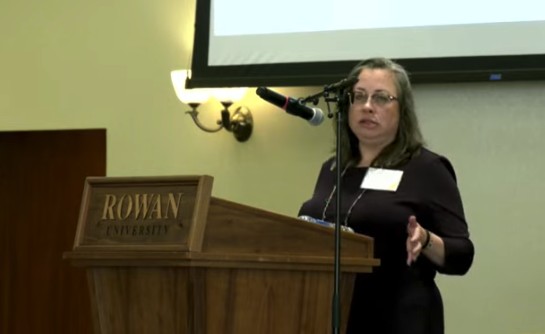AFTNJ President Jennifer S. Higgins spoke about the state of higher education in New Jersey during a panel discussion held Oct. 15 at Rowan University’s Steve Sweeney Center for Public Policy in Glassboro.
In her opening remarks, Higgins said that New Jersey is “the sixth chief exporter of college-age students in the country,” adding that scholarships from out-of-state institutions make it feasible for them to go elsewhere. “Those that don’t leave [New Jersey] today to pursue a college degree are [often] priced out of attending altogether,” she added.
Higgins continued: “Our current situation is a direct result of lack of state oversight and fiscal accountability. Public institutions need oversight, and because we don’t have it in New Jersey, we have a university system in competition with itself, as opposed to working more collaboratively together. And what I mean by this is we have a system of winners and losers, and it impacts our students, the workforce and the taxpayer.”
What’s prevented New Jersey colleges and universities “from going completely awry,” she said, are “the minimal funding they do get from the state and the collective bargaining agreements that are negotiated statewide by the Council of New Jersey State College Locals, as well as the collective bargaining agreements across Rutgers.”
Higgins also spoke about “the overreliance on contingent faculty,” describing it as “a lack of commitment to the workforce” as well as “a lack of commitment to the students, due to the fact that many adjuncts are forced to cobble together multiple jobs to make ends meet.” As a result, adjunct faculty “are unable to provide the same attention [as] tenured professors with job security, office space and time to meet and assist students.”
Higgins would like to see labor at the table in the future: “For far too long, the workers we represent at AFT New Jersey have been left out of the conversation, and now we’re dealing with the results.”
Near the end of the panel, Higgins said, “Our members … they work with the students. They understand on the front lines what students and their families are looking for, and I think including them in the conversation to derive at an appropriate solution is really going to be critical on whether or not we’re successful. We can have more commissions, and we can do more studies, but if workers aren’t involved in finding the solution to the problem, it’s still going to be a top-down situation.”



